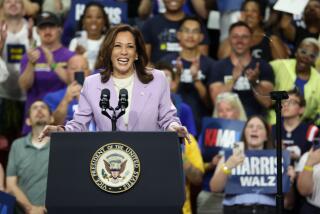Bradley Pins Victory Hopes on Get-Out-the-Vote Drive
SACRAMENTO — Tom Bradley on Thursday greeted runners at the end of his campaign’s 1,100-mile run through California and then urged volunteers to hit the sidewalks on election day for a get-out-the-vote drive.
The Democratic gubernatorial nominee welcomed Michelle Burke, 7, who is blind, and Shedia Nelson, 8, who led her in the final yards to the Capitol, the end of the race.
It was an upbeat moment in the campaign and Bradley clearly was working to have the mood carry over to the remaining days of his campaign against Republican Gov. George Deukmejian.
“What a great day this is,” Bradley told a few hundred supporters on the steps of the Capitol where he wants to reign next year. “I feel more confident today than any time during this campaign. Let me tell those headline writers, don’t write those headlines until Tuesday night. We’re going to win this election.”
On the Capitol steps, Bradley recalled how the same young people who finished his campaign run Thursday started 12 days ago in San Diego.
“Michelle Burke, blind since she was 6 months old . . , said, ‘I want to run but I can’t see.’ Shedia Nelson, 8 years old, said, ‘I’m a good athlete, I’ll hold her hand and we’ll run together.’ ”
There were no attacks on Deukmejian on this day. Instead, the mayor retold the story of his own climb from a sharecropper family’s poverty to his present prominence.
His message continued to be upbeat when he spoke to get-out-the-vote precinct workers at Democratic headquarters in Sacramento. Public opinion polls show the mayor trailing in Sacramento County.
“Get out our vote,” Bradley told volunteers in the storefront Democratic campaign organization headquarters.
“We’ll do it,” a few people shouted back.
Aides expressed hope for the get-out-the-vote drive, much of which is centered in black communities in Los Angeles, the San Francisco Bay Area and San Diego, where the mayor will visit churches on Sunday.
But they also expressed fear that the money shortage that has bedeviled the mayor’s campaign from the beginning would interfere with Election Day efforts to get voters to the polls.
That is because in poor black areas, the workers who drive voters to the polls and phone their homes usually must be paid a nominal amount to cover their baby-sitting and gasoline expenses. Expense money, Bradley aides said, will be in short supply Tuesday.
The effort is important to the campaign. In 1982, when Bradley narrowly lost to Deukmejian, the turnout in black areas was lower than expected, although Bradley carried the neighborhoods heavily. From the outset of this campaign, the mayor has insisted on strong grass-roots efforts to boost his black vote.
And money was clearly a major preoccupation.
Airborne Fund-Raising
Flying to Sacramento on a commercial airliner, campaign chairman Tom Quinn used the airplane telephone to make calls to raise money for television advertising.
And, on the flight back, Bradley handed chief finance aide Irene Trischler an envelope, presumably containing donations. “From a spaghetti feed,” he said.
Despite the difficulties, Bradley aides said they believe that publicity from the statewide run and a heavy dose of television commercials were bringing the mayor closer to the heavily favored Deukmejian.
Although California Poll results released Thursday showed Bradley trailing Deukmejian by 19 percentage points, Quinn said results of more recent private polling done for the Bradley campaign showed the gap narrowing.
Press secretary Ali Webb reported that the San Diego-to-Sacramento run, financed by contributors giving $500 a runner, netted $150,000 above costs estimated at about $250,000. That money, Quinn said, was used to buy television advertising time.
More to Read
Get the L.A. Times Politics newsletter
Deeply reported insights into legislation, politics and policy from Sacramento, Washington and beyond. In your inbox three times per week.
You may occasionally receive promotional content from the Los Angeles Times.










